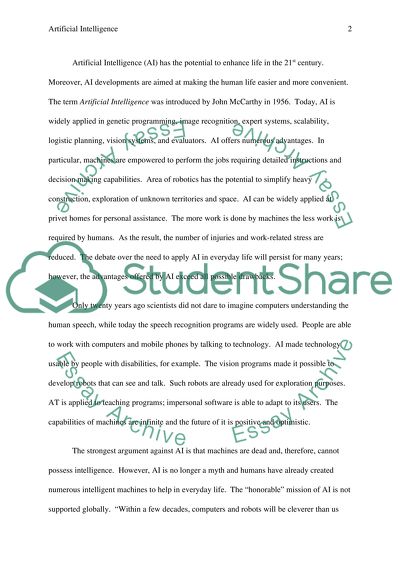Cite this document
(Drawbacks and Privileges of Artificial Intelligence Essay Example | Topics and Well Written Essays - 1500 words, n.d.)
Drawbacks and Privileges of Artificial Intelligence Essay Example | Topics and Well Written Essays - 1500 words. https://studentshare.org/technology/1525552-how-can-artificial-intelligence-enhance-life-in-the-21st-century-are-there-any-drawbacks-if-so-what-are-they-and-how-can-they-be-overcome
Drawbacks and Privileges of Artificial Intelligence Essay Example | Topics and Well Written Essays - 1500 words. https://studentshare.org/technology/1525552-how-can-artificial-intelligence-enhance-life-in-the-21st-century-are-there-any-drawbacks-if-so-what-are-they-and-how-can-they-be-overcome
(Drawbacks and Privileges of Artificial Intelligence Essay Example | Topics and Well Written Essays - 1500 Words)
Drawbacks and Privileges of Artificial Intelligence Essay Example | Topics and Well Written Essays - 1500 Words. https://studentshare.org/technology/1525552-how-can-artificial-intelligence-enhance-life-in-the-21st-century-are-there-any-drawbacks-if-so-what-are-they-and-how-can-they-be-overcome.
Drawbacks and Privileges of Artificial Intelligence Essay Example | Topics and Well Written Essays - 1500 Words. https://studentshare.org/technology/1525552-how-can-artificial-intelligence-enhance-life-in-the-21st-century-are-there-any-drawbacks-if-so-what-are-they-and-how-can-they-be-overcome.
“Drawbacks and Privileges of Artificial Intelligence Essay Example | Topics and Well Written Essays - 1500 Words”. https://studentshare.org/technology/1525552-how-can-artificial-intelligence-enhance-life-in-the-21st-century-are-there-any-drawbacks-if-so-what-are-they-and-how-can-they-be-overcome.


